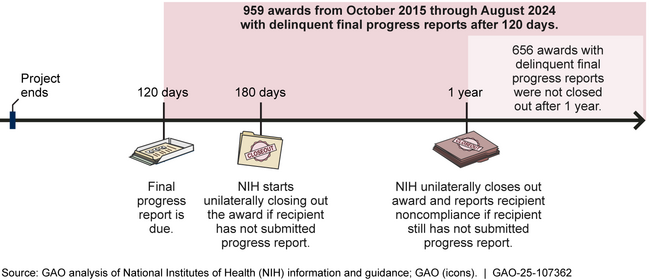National Institutes of Health: Monitoring of External Research Can Be Improved
Fast Facts
The National Institutes of Health funded about $35 billion in external biomedical research in FY 2023 to support its mission of advancing the nation's health.
NIH staff oversee such funds by reviewing financial and progress reports from the universities and other institutions that receive grants. But NIH didn't consistently take action when those reports were late. Also, NIH's component institutes and centers don't consistently track unused funds. These issues might make it harder for NIH to detect misspending and ensure its awards are made in appropriate amounts.
Our recommendations address this, and more.

Highlights
What GAO Found
The National Institutes of Health (NIH) supported nearly 65,000 ongoing research grants and other awards to external entities in fiscal year (FY) 2023 (the most recent year of data available at the time of GAO's review). These “extramural” awards go to entities such as universities and totaled more than $35 billion in FY 2023—an increase of nearly 30 percent from FY 2014 (after adjusting for inflation). During this period, NIH also increased its oversight staff by about 400 positions (20 percent). GAO requested, but NIH could not provide, information about the effect of recent administration actions on oversight staffing levels.
NIH reviews recipients' financial and progress reports as part of its oversight of awards. For example, NIH program officers check whether recipients' progress is satisfactory and whether recipients have a plan to address challenges. However, GAO found that NIH has not always closed out awards when recipients do not file final reports within 1 year of a project's end in accordance with its policy. As of August 2024, nearly 1,000 final progress reports were delinquent, or about 0.2 percent of awards made from FY 2014 through 2024 (see figure). NIH has made recent efforts to better ensure timely closeout, but it has not identified or addressed the factors that contribute to late reports. As a result, NIH cannot ensure that it is holding recipients accountable and identifying misspent funds.
NIH Grant and Cooperative Agreement Closeout Steps and Delinquent Final Progress Reports as of Aug. 2024

During certain grants, projects may carry over unobligated funds that remain unused at the end of a budget period into the next period. If NIH determines that some funds are not needed, it can restrict the recipient's ability to automatically carry over funds in the future. NIH allows for flexibility in how its institutes and centers manage carryover, but it has not developed an informational resource to help them choose the best option. Moreover, NIH does not require institutes and centers to track unused balances, even though NIH data show that large unused balances are common. Without an informational resource or tracking requirement, NIH cannot be assured that it is implementing carryover practices effectively and maximizing its funding for higher-value projects.
Why GAO Did This Study
NIH is the largest public funder of biomedical research in the U.S. According to NIH, more than 80 percent of its budget funds extramural research on a broad range of health-related topics. NIH grants management staff and program officers are the primary staff for ensuring that award recipients follow requirements.
GAO was asked to review NIH's policies and procedures for overseeing extramural research funding. This report focuses on grants and cooperative agreements and, among other things, (1) describes trends in NIH extramural funding and oversight staffing from FY 2014 through 2023, (2) assesses the extent to which NIH policies ensure appropriate use of these funds, and (3) assesses NIH's policies and procedures for limiting carryover of unused funds in extramural awards.
GAO reviewed agency policies, documents, and data through FY 2023 and performed checks on NIH monitoring data. GAO also interviewed federal officials, including officials from four NIH institutes, which GAO selected based on factors such as funding, staffing, and mission.
Recommendations
GAO is recommending that NIH (1) identify and address the factors contributing to delinquent final financial and progress reports, (2) develop an informational resource for managing unused award balances, and (3) require that NIH institutes and centers track unused balances across their award portfolios. NIH concurred with all three recommendations.
Recommendations for Executive Action
| Agency Affected | Recommendation | Status |
|---|---|---|
| National Institutes of Health | The Director of NIH should identify the contributing factors to delinquent final financial and progress reports and address these factors in revised guidance. (Recommendation 1) |
NIH concurred with this recommendation. It stated that an internal committee would gain an understanding of the factors that contribute to delinquent reports and that NIH would make changes in response to the committee's report and recommendations. We will provide updated information when we confirm what actions NIH has taken in response to this recommendation.
|
| National Institutes of Health | The Director of NIH should analyze how NIH institutes, centers, and offices use offsets, extensions, and budget restructuring to manage unused balances for projects at the end of the funding period and develop an informational resource on the benefits and risks of each method. (Recommendation 2) |
NIH concurred with this recommendation and stated it would produce an informational resource that will provide a consistent and standardized approach across the agency for managing unused balances. We will provide updated information when we confirm what actions NIH has taken in response to this recommendation.
|
| National Institutes of Health | The Director of NIH should require that its institutes, centers, and offices track award recipients' unused balances across their respective award portfolios. (Recommendation 3) |
NIH concurred with this recommendation and stated it would draft guidance to require the tracking of unused balances across award portfolios. We will provide updated information when we confirm what actions NIH has taken in response to this recommendation.
|
